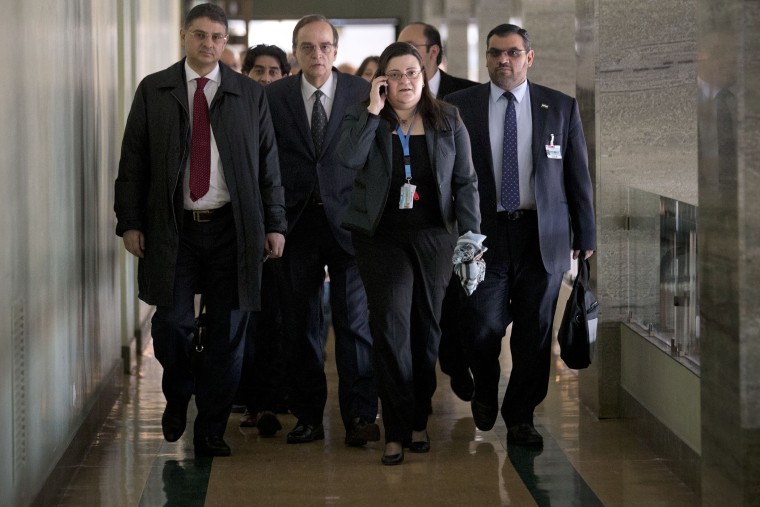The Syrian regime and opposition leaders will meet Saturday in the same room for the first time in three years, a United Nations mediator said Friday, following up reports from the peace conference in Geneva, Switzerland, that talks appeared to be on the verge of collapse.
The two sides engaged in separate talks for the third day on Friday in hopes of a resolution to end almost two years of civil war. The Syrian opposition had refused to meet with the government delegation unless it agreed to the need for a transitional government. Syrian President Bashar al Assad’s forces had refused to discuss the country's future before focusing on how to end the “terrorism” it claims is gripping the country. The government delegation threatened to leave Geneva if no “serious” work sessions were held by Saturday.
United Nations international mediator Lakhdar Brahimi said both parties were looking forward to the meetings "tomorrow morning and afternoon."
"Both sides understand how bad the situation is, which is becoming worse,” Brahimi said Friday.
“The huge ambition is to save Syria. Wish us luck," he continued.
At the World Economic Forum in neighboring Davos, Secretary of State John Kerry reinforced the need for a mutually agreed upon transitional government and Assad’s removal from power – the stated aim of the conference and the objective of the more than 40 countries and institutions that joined the talks.
“This can’t happen soon enough because Assad continues to kill and displace innocent Syrians, and in doing so has become the world’s greatest single individual magnet for jihad and terror,” Kerry said.
Deviating from his prepared remarks, Kerry said that the atrocities committed by the Assad regime disqualified him from holding any role in the transitional government. Kerry cited photographic evidence of torture brought to light on Monday and as well as scud missile attacks on doctors and university students, which Kerry condemned as “against the rules of warfare.”
“Assad will never have the legitimacy to govern Syria,” Kerry said. “Because of what he has done, because of the 130,000 people who have been killed, the opposition will never stop fighting while he is there. And so if your objective is to have peace, this one man must step aside.”
Kerry previously delivered an impassioned speech calling for Assad’s ouster last August after western evidence showed the government’s culpability in a chemical weapons attack that killed 1,500 people, including more than 400 children. The U.S. and Russia then brokered a deal to hold Assad accountable for destroying the country’s chemical weapons stockpile by June 2014. While international inspectors have verified Assad’s compliance to date, critics charge that the deal tied western interests up in Assad’s continued rule.
“We’ve already seen in Syria what forceful diplomacy is able to achieve: As we speak, a man who the day before he agreed to do it denied he even had the weapons, is now removing all the chemical weapons from the country,” Kerry said of Assad, calling the weapons removal “an unprecedented undertaking that is making the region and the world safer.”
“We are convinced that if the Syrian people are to have the chance to rebuild their country and if millions of Syrian refugees are to have the chance to return home, it is ultimately diplomacy that will make it possible,” Kerry said. “There is no military solution to the problem of Syria.”
